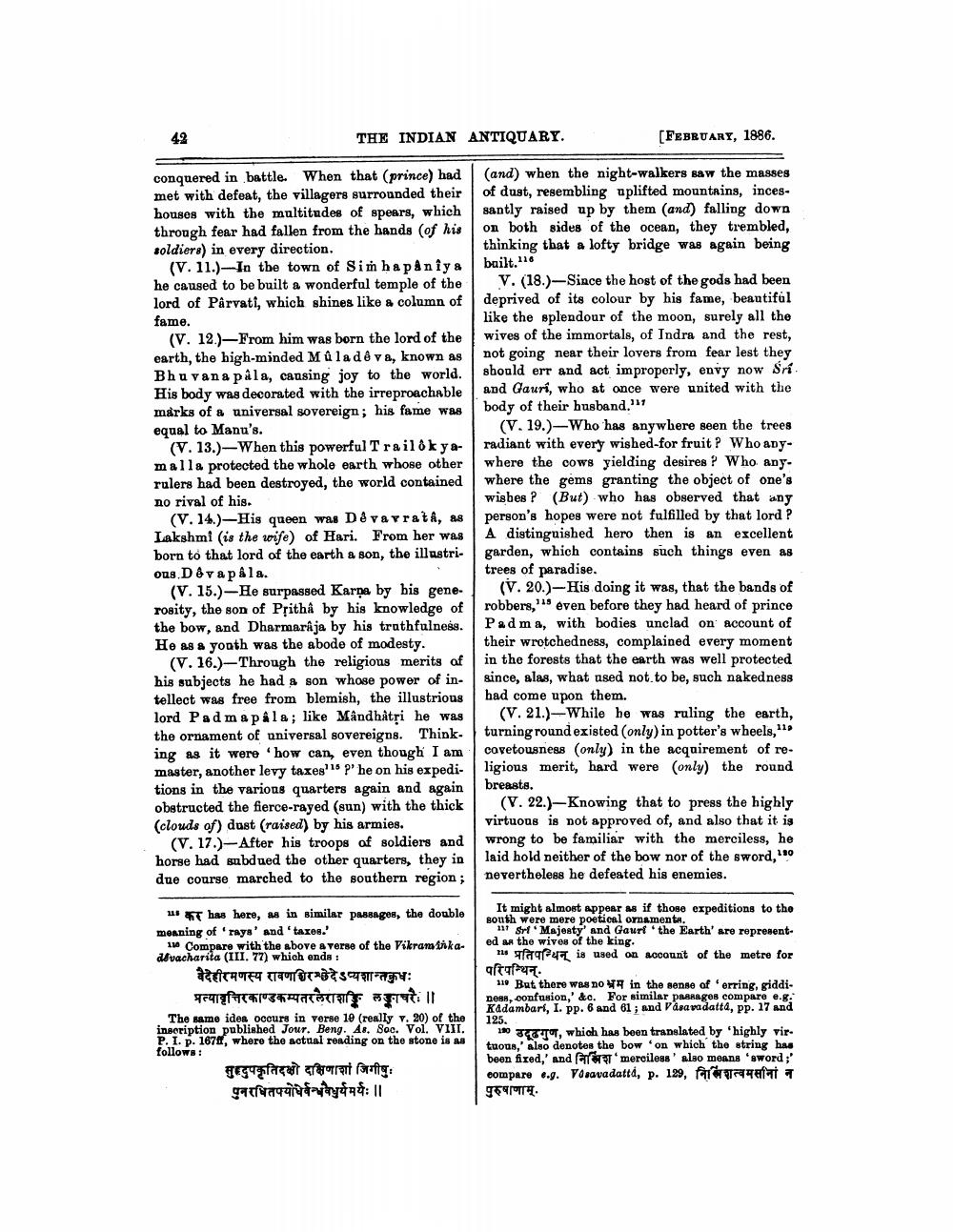________________
THE INDIAN ANTIQUARY.
[FEBRUARY, 1886.
conquered in battle. When that (prince) had l (and) when the night-walkers saw the masses met with defeat, the villagers surrounded their of dust, resembling uplifted mountains, inceshouses with the multitudes of spears, which santly raised up by them (and) falling down through fear had fallen from the hands (of his on both sides of the ocean, they trembled, soldiers) in every direction.
thinking that a lofty bridge was again being (V. 11.)- In the town of Si hapa niya bailt.118 he caused to be built a wonderful temple of the V. (18.)-Since the host of the gods had been lord of Parvati, which shines like a column of deprived of its colour by his fame, beautiful fame.
like the splendour of the moon, surely all the (V. 12.)–From him was born the lord of the wives of the immortals, of Indra and the rest, earth, the high-minded Müladê ve, known as not going near their lovers from fear lest they Bhuvana pala, causing joy to the world. should err and act improperly, envy now Sri His body was decorated with the irreproachable
and Gauri, who at once were united with the marks of a universal sovereign; his fame was
body of their husband."17 equal to Manu's.
(V. 19.)-Who has anywhere seen the trees (V. 13.)-When this powerful Trailok ya- radiant with every wished-for fruit? Who any. malla protected the whole earth whose other where the cows yielding desires ? Who any. rulers had been destroyed, the world contained where the gems granting the object of one's no rival of his.
wishes ? (But) who has observed that any (V. 14.)-His queen was Déva vrata, as person's hopes were not fulfilled by that lord ? Lakshmi (is the wife) of Hari. From her was a distinguished hero then is an excellent born to that lord of the earth & son, the illustri- garden, which contains such things even as ons Dévapala.
trees of paradise. (V. 15.)-He surpassed Karņa by his gene. (V. 20.)-His doing it was, that the bands of rosity, the son of Prithả by his knowledge of robbers,' even before they had heard of prince the bow, and Dharmaraja by his truthfulness. Padma, with bodies unclad on account of He as a yonth was the abode of modesty. their wrotchedness, complained every moment
(V. 16.)-Through the religions merits of in the forests that the earth was well protected his subjects he had a son whose power of in- since, alas, what used not to be, such nakedness tellect was free from blemish, the illustrious had come upon them. lord Padmapala; like Mandhati he was I (V. 21.)-While he was ruling the earth, the ornament of universal sovereigns. Think. turning round existed (only) in potter's wheels, 10 ing as it were 'how can, even though I am covetousness (only) in the acquirement of remaster, another levy taxes's Phe on his expedi- ligious merit, hard were (only) the round tions in the various quarters again and again breasts. obstructed the fierce-rayed (sun) with the thick (V. 22.)-Knowing that to press the highly (clouds of) dust (raised) by his armies.
virtuous is not approved of, and also that it is (V. 17.)- After his troops of soldiers and wrong to be familiar with the merciless, he horse had subdued the other quarters, they in laid hold neither of the bow nor of the sword, 10 due course marched to the southern region; nevertheless he defeated his enemies.
W FT has here, as in similar passages, the double meaning of 'raya' and 'taxes.'
14 Compare with the above a verse of the Vikram tikadivacharita (III. 77) which ends :
वैदेहीरमणस्य रावणशिर छेदेऽप्यशान्तकुधः
प्रत्यावृत्तिरकाण्डकम्पतरलैराशति लापरैः ।। The same iden occurs in verse 19 (really v. 20) of the inscription published Jour. Beng. As. Soc. Vol. VIII. P. I. p. 16718, where the actual reading on the stone is as follows:
सुदुपकृतिदक्षो दक्षिणाशां जिगीषु: gati941948:11
It might almost appear as if those expeditions to the south were mere poetical ornamenta.
17 Srl Majesty' and Gaurf the Earth' are represented as the wives of the king. m aqul is used on account of the metre for परिपन्थिन्.
110 But there was no A in the sense of 'erring, giddiness, oonfusion,' &o. For similar passages compare e.g. Kadambari, I. pp. 6 and 61 ; and Väsa vadatta, pp. 17 and
125.
10 T TT, which has been translated by 'highly vir. tuous,' also denotes the bow on which the string hos been fixed,' and merciless' also means "sword;' compare ... Visavadattá, p. 129, P r anatat पुरुषाणाम्.




